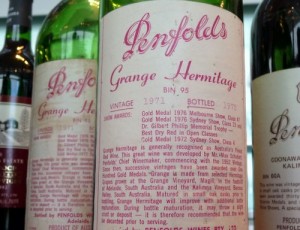
Wine is a solution of lots of chemicals. The most expensive wines in the world sell for thousands of dollars a bottle. The difference between the world’s most expensive wines and the cheap wines most people consume regularly? Different chemicals. So, in theory, if you could isolate all the chemicals in an expensive wine, you could find out which the most important ones were, and produce a synthetic wine. If you could do this successfully, so that your fake wine would be indistinguishable from the real thing by expert tasters, then presumably you have a business opportunity?
Not so fast. Assuming it were to be possible to make an accurate fake wine (and this is a big assumption, which we’ll deal with later), would collectors be interested? Say, for example, you could make a dead ringer for Chave Hermitage or Rousseau Chambertin or Château Haut Brion, from a good vintage: would this be a wine that would make you lots of money?
I’d argue that this would be of limited interest, because people want the real thing.
Let’s consider replica paintings. It’s possible to reproduce great works of art so well that anyone but a trained expert could be fooled into thinking they are the real thing. People consumer these art works by looking at them, and you are getting exactly the same visual experience by looking at a replica. But no one is interested in going to a gallery to look at replica paintings. They want to see the real thing. Genuineness is part of the appeal.
OK: I might not be able to tell the difference. All that matters is that someone can tell the difference. If no one could tell the difference, and real and fake paintings were in circulation, it would diminish the value of both.
Your replica wine might not be distinguishable from the real thing by most tasters. But that’s not the point. It matters that a wine is real. Genuine. Authentic.
There’s also a practical obstacle here. Technically, making synthetic wine is quite a challenge. There are all sorts of matrix effects (have you ever tasted dealcoholized or low alcohol wines? They really miss the alcohol, and it’s hard to replace its contribution). Some compounds are present at below-threshold levels but interact with others to change the flavour of the wine. It’s not simple chemistry.
It would also be quite expensive. Grapes and microbes are a remarkably affordable way of synthesizing some complex flavour chemicals.
So is there any interest in synthetic wines? I’d argue that they could be useful for two reasons. The first is as training aids. You could create wines and then add or subtract various flavour compounds, or groups of flavour compounds. You could dial in certain wine faults in very controlled levels. The second is related: the ability to dial up or down components of the wine makes them useful experimental tools for wine research. [In this case, it would be possible to start with a de-aromatized wine matrix and add back the aromatic components, so there is no need to create a synthetic wine from scratch.] Apart from this, they are just a novel idea; a bit of noise and fluff. Something for us to discuss, and a way for tech companies to try and raise a bit of funding.
2 Comments on Could synthetic wines be interesting?


It’s a matter of cost. I’ve never tasted a great Burgundy (the $5k-$10k / bottle stuff), nor a great Petrus, etc. ,etc.. At the right price, I would buy identical synthetics, just for the experience. “Authenticity” would not be part of my decision process.
What is brought to mind by this is the article by Jefford that, “Wine is also a dream.” One of the best articles ever written about the attraction to wine.
It is all in our mind.